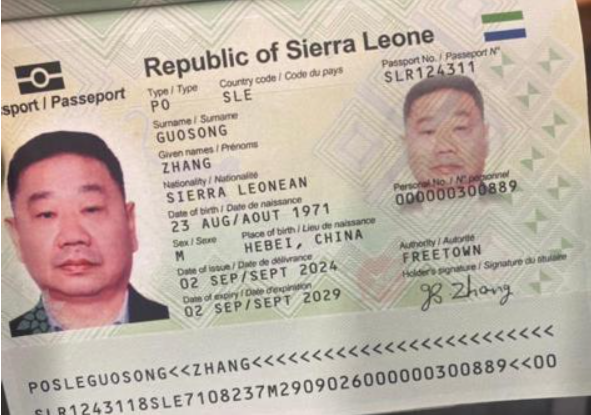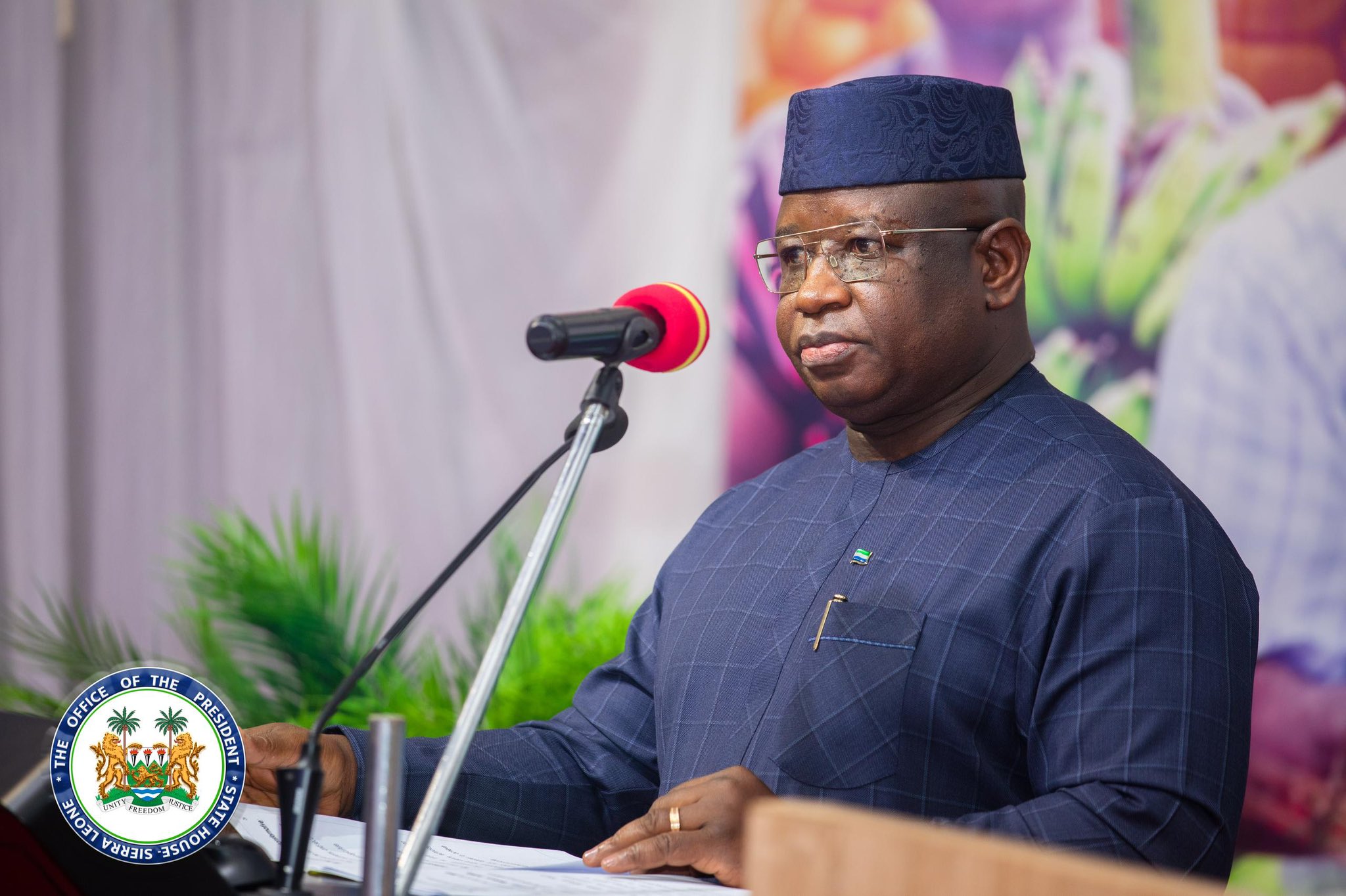Researched by Kemo Cham
On October 14, 2024, a copy of the Sierra Leonean passport with biodata details of a Chinese national was widely circulated on social media, amid debate about its authenticity.
The post shared on X with the caption “Is this true? Chinese Sierra Leoneans have started showing up in Sierra Leone with Sierra Leone Passport! What a sweet diversity!” triggered massive reactions.
Some users queried whether acquiring a Sierra Leonean passport as a foreigner has any criminal implications.
However, the document rekindled public discussion on the integrity of the country’s national identification documents.
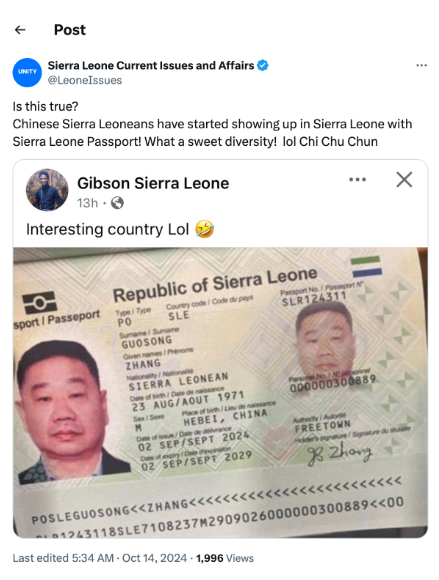 Fig 1 – Screenshot of a post on X
Fig 1 – Screenshot of a post on X
Fact-check
The Sierra Leone Immigration Department (SLID) confirmed in an interview with FactSpace Sierra Leone that the passport in question was authentic. An official in the department said the bearer acquired it through an official channel per the stipulated laws.
Amara Ghando, a Communication Officer at SLID, in a telephone conversation with FactSpace Sierra Leone, said foreign nationals who meet requirements per stated citizenship acquisition laws of the country are qualified for dual citizenship.
“That person went through all the processes involved and he met all the criteria set. It is no secret. All the evidence is available at the office here for verification,” he said.
FactSpace Sierra Leone did a comparative analysis of a famous passport to the viral one to ascertain its authenticity on the face of both documents.
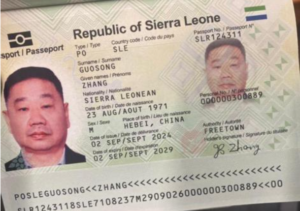
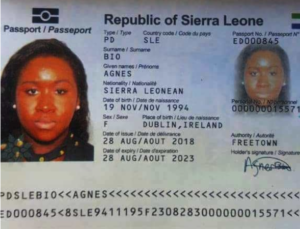
Fig 2 – The viral biodata page of the controversial passport Fig 3 – Biodata page of President Maada Bio’s niece published in 2019
This passport copy of Agnes Bio, niece of President Julius Maada Bio, was published by the Night Watch Newspaper in 2019 as part of a report critiquing the new administration at the time of illegally issuing passports to relatives who did not deserve them.
Analysis
- All features on both passports align on the face of the documents, among others, the positions of details like passport type, country code, name, nationality, date of birth and details relative to the date of issuance and expiry are the same.
- Other details such as the passport number, personal bio, and the signature of authority are regular, as is the Machine Readable Zone (MRZ) of both documents.
- The main difference between both passports is the type; PO in the case of the Chinese Sierra Leonean holder with PD for Bio. Sierra Leone, like most countries, issues ordinary, service diplomatic passports.
Verdict:
From the above, the viral passport is confirmed as authentic.
Sierra Leone’s citizenship laws
In 2006, Sierra Leone reintroduced dual citizenship in its laws, after it was prohibited for over 30 years under the erstwhile 1973 citizenship law. Officials say the process of naturalization was halted due to concerns of abuse of the system.
This legislation extends citizenship rights to emigrants who have naturalised in another country.
Shortly after the Chinese Sierra Leonean’s passport appeared online, mainly on the social media platform WhatsApp. The Immigration Department released a statement announcing that the country had resumed its naturalisation process for eligible foreign nationals.
According to the un-dated statement, the process resumed on October 1, 2024, but the issuing date on the passport of the Chinese man was on September 2, 2024.
Dual citizenship legislation has become popular in many African countries in recent years, as many Africans travel abroad, especially to the West, in search of greener pastures for economic reasons or education, among other purposes.
Dual citizens seeking to hold public office
Sierra Leone, due to its eleven years (1991-2002) civil war, saw a lot of its citizens flee to foreign countries. Many of them made families abroad and after the end of the war, tried to return home.
Recently, dual citizenship legislation became a challenge for citizens seeking political offices. According to the law, the rights of those with dual citizenship are limited.
For instance, people with dual citizenship cannot be elected President. However, the same legislation was interpreted by some legal experts as disqualifying holders of dual citizenship from contesting as Members of Parliament.
The phenomenon, locally referred to as Two-Sim, was topical ahead of the 2018 general elections. Many Sierra Leoneans who returned home from the diaspora with political ambitions were forced to relinquish their foreign nationalities or kiss their political ambitions goodbye. Among them were prominent figures, like Dr Kande Yumkella, a former UN Under-Secretary-General. He has run for the presidency twice since 2018.
Yumkella announced in 2018 that he had renounced his United States citizenship, which he reportedly acquired in 1995. That notwithstanding, his citizenship was the subject of a Supreme Court hearing in 2021, when he was elected as a Member of Parliament, after failing in his presidential bid.
A member of the opposition All People’s Congress (APC), who lost to Yumkella in that election in the northern region challenged his victory on the grounds of his dual citizenship.
But the Supreme Court eventually ruled in September 2021, that Yumkella had renounced his US citizenship. Details of the ruling revealed the renunciation was made at the US Embassy in Freetown in 2017.
History of passport controversy
Sierra Leone is no stranger to controversy surrounding the integrity of its national documents, particularly its passports. The officials in the Immigration Department have been criticised in the past, for illegally selling passports to foreign nationals.
In some cases, citizens have been granted passports above their qualifications, like service or diplomatic passports, as opposed to ordinary passports.
The most famous case in point was in 2018, when the Anti-Corruption Commission (ACC) of Sierra Leone, aided by the Consular department of the US Embassy in Freetown, uncovered a “cartel” in the country’s Foreign Affairs Ministry and Immigration department involved in the illegal sale of passports to citizens and foreign nationals who used them to acquire US visas to relocate.
An operation at the US embassy led to the arrest of nine people by ACC operatives after the suspects attempted to apply for visas with service passports, which are meant for only government employees for work-related travel. Among those detained were a former ambassador of Sierra Leone to the United Nations. A former immigration chief was also declared wanted after fleeing to the UK in connection to the incident.
While the alleged crimes happened during the tenure of the administration of former President Ernest Bai Koroma, reports of passport fraud continued under the current administration of President Julius Maada Bio.
In 2022, the Ministry of Foreign Affairs uncovered a large-scale visa, passport and scholarship scam.
Just last year, a Lebanese national resident in Freetown was arrested, according to reports, for involvement in the sale of fake passports.
Another incident showing the persistence of this issue was revealed by an investigation conducted by the anti-graft agency last year.
The subject of the investigation was a man who fraudulently registered a real estate company and collected money from unsuspecting clients for houses that were never built.
The subject who was later proven to be a Nigerian who fled his country after being convicted for financial crimes, fraudulently acquired a Sierra Leonean Passport to enable him to do his business as a Sierra Leonean.

